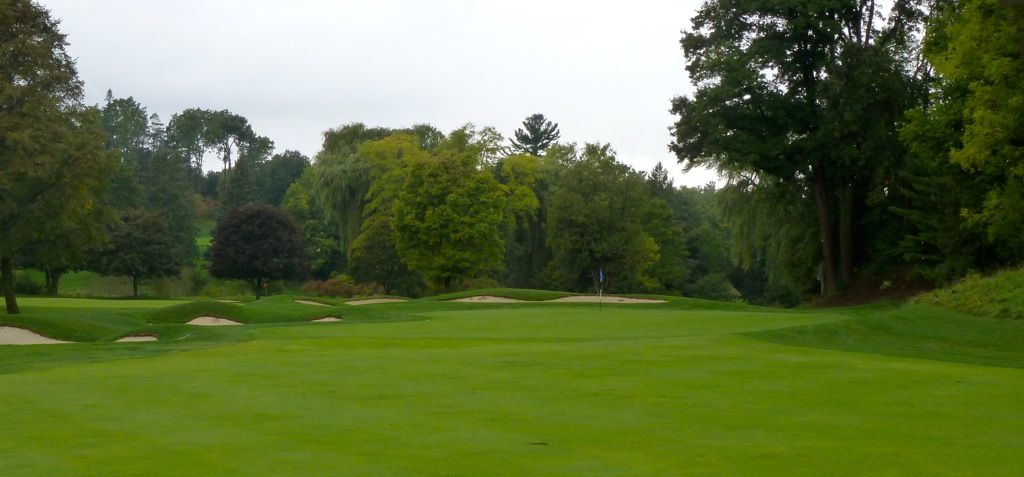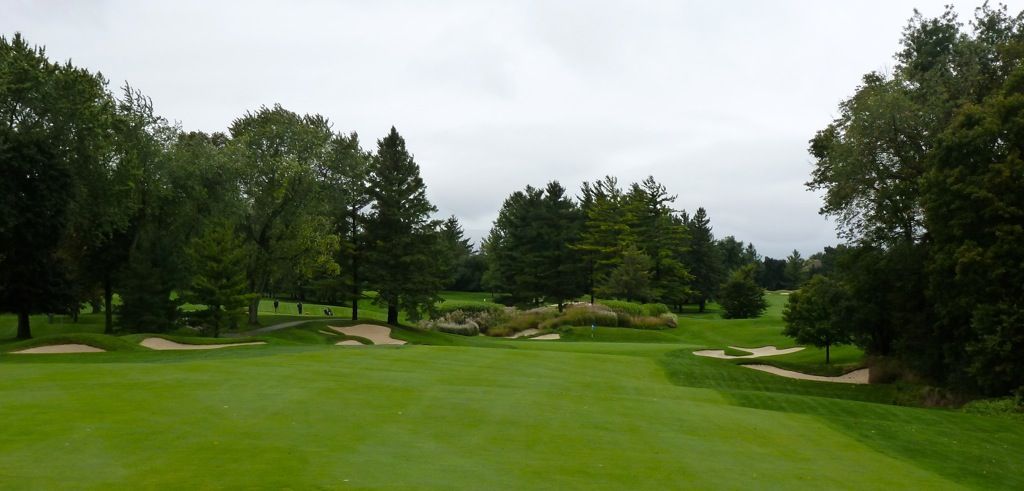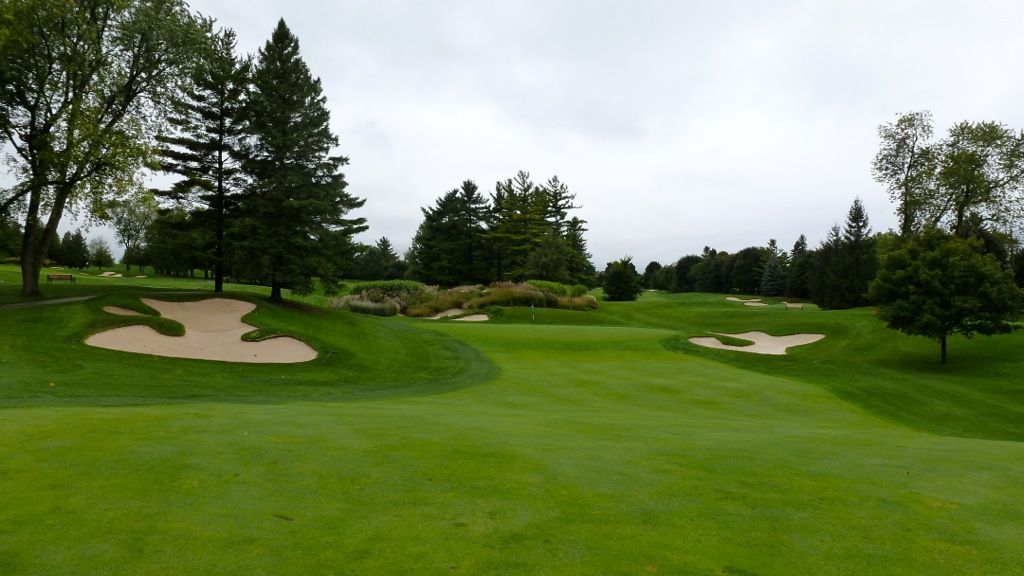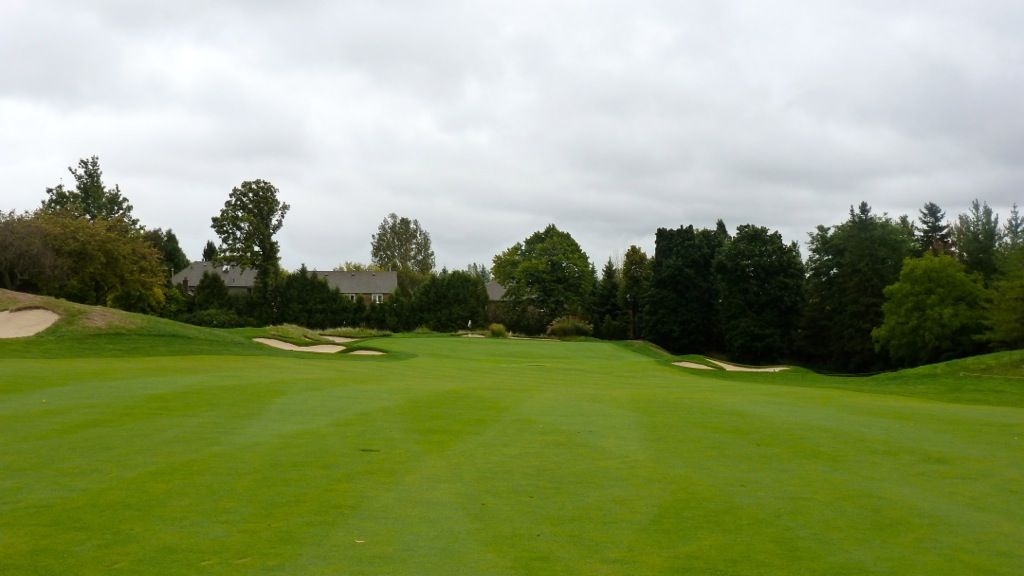Thornhill G&CC is something of a hidden gem, despite its recent recognition as the 17th best classic course in Canada (GolfWeek) and the 84th best course in Canada by ScoreGolf -- for what it's worth, I think Score has it woefully underrated.
Thornhill borders the once much acclaimed Uplands GC, which is now a 9-holer with one of the world's most difficult par-3s (my review:
http://onegolferstravels.blogspot.ca/2012/06/uplands-golf-club-course-review.html). Though the course is only a few kilometres from the city, and is situated on Yonge St, one of the busiest streets in the world, once on property one is blessed with a sense of seclusion as he is treated to ideal and rolling golfing terrain.

For those interested in tournament pedigree, Thornhill was the site of Byron Nelson's 11th consecutive victory in 1945...

The course is short by modern standards, playing to a 6,666 yard par-71, but a plethora of uphill shots, fairways that often tilt toward the tee, a demanding set of par-3s and clever bunkering keep the course relevant and interesting for most.
The first tee is set atop a steep drop-off and the first hole plunges into a valley. Though the first tee shot is dramatic, the first hole is one of the least interesting on the course.

Nonetheless, the green shape and specifically the green site are particularly well done, a theme that is constant throughout the golf course.

Holes 2-4 are routed over the only flat terrain on the golf course, but Thompson's clever use of a stream running through the property adds interest to these holes. Amazingly, these 3 holes are the only flat holes on the property! At the 2nd the stream guards the left side of the DZ and runs along the side of the green.
At the 3rd the stream is again in play, crossing the fairway 100 yards short of the green. The 3rd is something of an awkward short par-4 requiring a forced lay-up for most, but once again the green site is exceptional well done, tucked into a corner of the property.

Bunkering at Thornhill is spectacular. The bunkers fit well with the landforms, but also maintain the unique Thompson flair in bunkering.

The 4th is a wonderful par-4. Though there is no elevation change, the rolls in the 4th fairway must near 6 feet high.

The 5th is the first of a very difficult set of par-3s. For the critics among us, it is possible to argue that while each hole is interesting, as a set there is not sufficient variety as the four par-3s range from 171-192. The 5th plays more uphill than it looks (and it looks way uphill!) to a green that is completely blind from the tee. The good news is that the green is much larger than one would think; the bad news is that the bunker / fall-off right of the green is much deeper than one would think.

The 6th is a massive par-4, played up and over a rise. Bunkers on the inside of the dogleg must be challenged if one wants to find short grass on this reverse-camber fairway. Thompson's use of forced perspective here is very well done. A pair of bunkers set into a hill 100 yards short of the green are meant to look green side...

BUT clearly are not as this picture from next to one of them shows!

The back of the greens at Thornhill are often very protected. A perfect example at the 6th...

The 7th is another uphill par-3, this one playing to an angled green:

The first two par-5s at Thornhill are very big holes. The 8th plays to over 580 yards thanks to a new back tee and the water guarding the lay-up zone is once again a key determinant of strategy:

Ian Andrew has called the mid-length par-4 9th one of Thompson's best par-4s, and it is easy to see why. A very natural looking golf hole where the majority of the interest is around the green. The green is 3-tiered and surrounded completely by bunkering.

I believe the 10th was once a shorter par-3, but a new back tee near 190 yards has been added. The hole is unforgiving, once again playing uphill to a green surrounded completely by bunkers. Bunkers benched into the hill over the green should not be in play but work to make the green feel smaller.


The 11th is a reverse dogleg, with a ramp short of the green encouraging the ground game. Mowing lines make a running approach more difficult, but it remains the preferred way to play the hole.

The 12th is an epic par-3, requiring an all-carry 190 yard tee shot to a tiny green (amazingly, this hole played to 215 yards in 1945!).


A funnel fairway at the 13th will have most well-struck tee shots ending up in the same spot, 190 yards short of the green and leaving a semi-blind approach. Only the longest of hitters can consider playing over the fairway bunkering.

The 14th is a quirky up-and-over par-4. The tee shot is completely blind, with a tee shot of some 240 yards required to crest the hill and to have a view of the green. Once over the hill, the approach is straightforward with a ramp short of the green that begs for the ground game. The 14th green is one of the best on the course as the green edges form something of a punchbowl, and a large hump rises from the green's centre.


The 15th is a very downhill par-5, playing to over 600 yards. Staggered fairway bunkers in the driving zone, and a pair of bunkers jutting into the lay-up are 150 yards short of the green, ensure that every shot on this par-5 must be properly considered.

The 16th, aptly named Goal Posts, requires a tee shot to split a pair of trees to find the fairway. Ideally, the golfer will approach from the left as the tilt of the land from the right makes shots from that side easier to control.

A reprieve, the 17th is a very short par-5, playing to only 450 yards. Tee shots must carry 240 yards to crest a hill that will leave a view of the green; fail to do so and the tee shot will funnel back some 20 yards to a lowpoint in the fairway, from which a lay-up is mandated. Golfers going for the green must carry a cross-bunker 40 yards short of the green, but must be careful not to go long as not only is this the most severely contoured green on the course, but it may be the most tilted too.

The 18th is a short par-4 that may call for less than driver for some as the stream is only 300 yards to reach. Fittingly, the green site is wonderful, the back of the green protected, and Thompson's most creative bunker on the course is present left of the 18th green.

